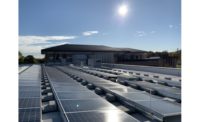The new restaurant officially opened January 16, 2003 by the Danish environmental minister, Hans Chr. Schmidt, in the town of Vejle, uses 100% HFC-free technology in all its refrigeration and ventilation equipment, including refrigerators, refrigerating rooms, freezing rooms, A/C equipment, and soda, juice and ice-cream machines.
"We have a shared responsibility for the future. Companies play a key-role in modern environment politics alongside consumers and governments. Today McDonald's is showing us how companies can make a difference by setting new standards for environmental performance, and I hope that this will accelerate the use of HFC-free refrigeration and ventilation equipment. It's a good day for the environment," Schmidt stated in his speech at the opening.
The project first began two years ago following an international "Refrigeration Summit" hosted by McDonald's and the United Nations Environmental Programme and the U.S. Environmental Protection Agency. McDonald's was joined by a number of other companies and organizations including Greenpeace. As a result of what McDonald's learned, McDonald's decided to accelerate ways to find sustainable refrigerant technologies.
"This restaurant is an important stepping stone toward establishing a market demand for innovative, sustainable refrigerants," stated Bill Hallett, vice president, worldwide equipment and operations, McDonald's Corporation.
Denmark was chosen as the ideal country in which to locate the test restaurant, since it had already started initiatives to phase out HFC refrigerants. McDonald's then set to work in close collaboration with the Danish Ministry of the Environment, the Danish Technological Institute, and four Danish companies in order to find the most efficient solution.
"When an internationally renowned company like McDonald's shows an interest in employing harmless refrigerants, it is an extremely important political and environmental message to other companies. The commercial incentive is equally important as all legislations in the field," said Kim Gardo Christensen, manager at the Danish Technological Institute.
"The new restaurant is particularly interesting, because never before have so many different kinds of refrigeration equipment in one place been converted to the new refrigerants," he added. The HFC-free McDonald's met with solid approval from environmental organizations, commending McDonald's for its leadership actions toward finding better environmental alternatives. HFCs are currently the predominant refrigerant used by virtually all companies in the food service business.
"Greenpeace welcomes the bold step McDonald's has taken in opening this first-ever HFC/HCFC-free restaurant. We hope it is the first of many for the company and that it sparks more sustainable innovation from the refrigeration industry and others in the food service sector," said Janos Mate from Greenpeace International.
McDonald's will use the findings from this pilot program to determine future applications and expansion. The pilot program will analyze impacts on energy consumption, safety, performance, maintenance reliability, serviceability, and cost.

